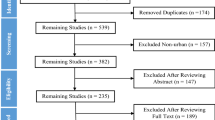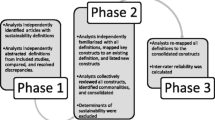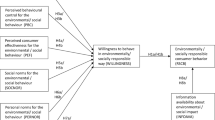Abstract
Purpose of Review
A proliferation of research has emerged in the last 20 years, and especially in the last 5 years, on how to effectively engage inhabitants in energy and resource saving behaviors in the residential context. Such conservation behavior is critically important in addressing climate change and other associated energy impacts. However, feedback and behavioral interventions face challenges in motivating behavioral change that stem from individual and social psychological factors, as well as broader social and economic problems such as split incentives.
Findings
We provide an overview of energy intervention research focusing on (1) different forms of intervention across contexts, (2) combined effects of intervention strategies, (3) consideration of residential demographics and individual characteristics, and (4) additional considerations for successful interventions.
Summary
Our review demonstrates that there is significant variation in success across interventions, and that the context, decision structures, and combinatory choices can dramatically affect an intervention. Interventions that combine feedback, motivation, high engagement, and goal setting with well-designed and frequent communication are usually more effective.
Similar content being viewed by others
References
Papers of particular interest, published recently, have been highlighted as: • Of importance •• Of major importance
Seligman C, Darley JM, Becker LJ. Behavioral approaches to residential energy conservation. Energ Buildings. 1978;1:325–37.
Becker LJ. Joint effect of feedback and goal setting on performance: a field study of residential energy conservation. J Appl Psychol. 1978;63:428–33.
Dixon RK, McGowan E, Onysko G, Scheer RM. US energy conservation and efficiency policies: challenges and opportunities. Energy Policy. 2010;38:6398–408.
Bird S, Hernández D. Policy options for the split incentive: increasing energy efficiency for low-income renters. Energy Policy. 2012;48:506–14.
Gillingham K, Harding M, Rapson D. Split incentives in residential energy consumption. Energy J. 2012;33
Frondel M, Vance C. Energy efficiency: don’t belittle the rebound effect. Nature. 2013; https://doi.org/10.1038/494430c.
Gillingham K, Rapson D, Wagner G. The rebound effect and energy efficiency policy. Rev Environ Econ Policy. 2016;10:68–88.
Frederiks ER, Stenner K, Hobman EV. Household energy use: applying behavioural economics to understand consumer decision-making and behaviour. Renew Sust Energ Rev. 2015;41:1385–94.
Granade HC, Creyts J, Derkach A, Farese P, Nyquist S, Ostrowski K (2009) Unlocking energy efficiency in the U.S. economy. Mckinsey & Company
Abrahamse W, Steg L, Vlek C, Rothengatter T. A review of intervention studies aimed at household energy conservation. J Environ Psychol. 2005;25:273–91.
Karlin B, Zinger JF, Ford R. The effects of feedback on energy conservation: a meta-analysis. Psychol Bull. 2015;141:1205–27.
•• Delmas MA, Fischlein M, Asensio OI. Information strategies and energy conservation behavior: a meta-analysis of experimental studies from 1975 to 2012. Energy Policy. 2013;61:729–39. Excellent meta-analysis of many factors with a comprehensive overview of all experimental studies.
Faruqui A, Sergici S, Sharif A. The impact of informational feedback on energy consumption—s survey of the experimental evidence. Energy. 2010;35:1598–608.
Stinson J, Willis A, Williamson JB, Currie J, Smith RS. Visualising energy use for smart homes and informed users. Energy Procedia. 2015;78:579–84.
• Buchanan K, Russo R, Anderson B. The question of energy reduction: the problem(s) with feedback. Energy Policy. 2015;77:89–96. Provides a comprehensive critique of many of the challenges inherent in the development of feedback and behavioral motivation.
Legault L, Bird S, Powers SE, Sherman AK, Schay A, Hou D, Janoyan K (2018) Impact of a motivational intervention and interactive feedback on electricity and water consumption: a smart housing field experiment. Under Review
Bird S, Hou D, Janoyan K, Legault L, Powers SE, Fox L, Rowe A, Schay A, Sherman AK (2016) Clean energy and smart student housing: motivational interventions for improved energy efficiency in university housing. New York State Energy Research and Development Authority, Albany, NY
Wilson C, Dowlatabadi H. Models of decision making and residential energy use. Annu Rev Environ Resour. 2007;32:169–203.
Guo Z, Zhou K, Zhang C, Lu X, Chen W, Yang S. Residential electricity consumption behavior: influencing factors, related theories and intervention strategies. Renew Sust Energ Rev. 2018;81:399–412.
Sanguinetti A, Dombrovski K, Sikand S. Information, timing, and display: a design-behavior framework for improving the effectiveness of eco-feedback. Energy Res Soc Sci. 2018;39:55–68.
Buchanan K, Russo R, Anderson B. Feeding back about eco-feedback: how do consumers use and respond to energy monitors? Energy Policy. 2014;73:138–46.
Sherman AK, Rowe AJ, Bird S, Powers S, Legault L. Motivational orientation explains the link between political ideology and proenvironmental behavior. Ecopsychology. 2016;8:239–49.
Tannenbaum D, Fox CR, Rogers T. On the Misplaced Politics of Behavioural Policy Interventions. Nature Human Behaviour. 2017;1(7):0130. https://doi.org/10.1038/s41562-017-0130.
McCalley LT. From motivation and cognition theories to everyday applications and back again: the case of product-integrated information and feedback. Energy Policy. 2006;34:129–37.
Nilsson A, Bergstad CJ, Thuvander L, Andersson D, Andersson K, Meiling P. Effects of continuous feedback on households’ electricity consumption: potentials and barriers. Appl Energy. 2014;122:17–23.
Alahmad MA, Wheeler PG, Schwer A, Eiden J, Brumbaugh A. A comparative study of three feedback devices for residential real-time energy monitoring. IEEE Trans Ind Electron. 2012;59:2002–13.
Jain RK, Taylor JE, Peschiera G. Assessing eco-feedback interface usage and design to drive energy efficiency in buildings. Energ Buildings. 2012;48:8–17.
Fischer C. Feedback on household electricity consumption: a tool for saving energy? Energ Effic. 2008;1:79–104.
• Abrahamse W, Steg L. Social influence approaches to encourage resource conservation: a meta-analysis. Glob Environ Chang. 2013;23:1773–85. This meta-analysis is not as comprehensive as Delmas, but provides an effective and more detailed discussion and analysis of motivation and social psychology factors in behavioral change.
DeWaters J, Powers S. Establishing measurement criteria for an energy literacy questionnaire. J Environ Educ. 2013;44:38–55.
Lynham J, Nitta K, Saijo T, Tarui N. Why does real-time information reduce energy consumption? Energy Econ. 2016;54:173–81.
Pasini D, Reda F, Häkkinen T. User engaging practices for energy saving in buildings: critical review and new enhanced procedure. Energ Buildings. 2017;148:74–88.
Kang NN, Cho SH, Kim JT. The energy-saving effects of apartment residents’ awareness and behavior. Energ Buildings. 2012;46:112–22.
Geller H, Harrington P, Rosenfeld AH, Tanishima S, Unander F (2006) The experience with energy efficiency policies and programmes in IEA countries: learning from the Critics. Energy Policy 34:556–573
Asensio OI, Delmas MA. The dynamics of behavior change: evidence from energy conservation. J Econ Behav Organ. 2016;126:196–212.
Delmas MA, Lessem N. Saving power to conserve your reputation? The effectiveness of private versus public information. J Environ Econ Manag. 2014;67:353–70.
Jain RK, Gulbinas R, Taylor JE, Culligan PJ. Can social influence drive energy savings? Detecting the impact of social influence on the energy consumption behavior of networked users exposed to normative eco-feedback. Energ Buildings. 2013;66:119–27.
Anderson K, Song K, Lee S, Krupka E, Lee H, Park M. Longitudinal analysis of normative energy use feedback on dormitory occupants. Appl Energy. 2017;189:623–39.
Abrahamse W, Steg L, Vlek C, Rothengatter T. The effect of tailored information, goal setting, and tailored feedback on household energy use, energy-related behaviors, and behavioral antecedents. J Environ Psychol. 2007;27:265–76.
Allcott H. Social norms and energy conservation. J Public Econ. 2011;95:1082–95.
Carmi N, Mostovoy N. The effect of group size on energy consumption by communal electricity users. J Environ Psychol. 2017;54:50–6.
Burchell K, Rettie R, Roberts TC. Householder engagement with energy consumption feedback: the role of community action and communications. Energy Policy. 2016;88:178–86.
Timm SN, Deal BM. Effective or ephemeral? The role of energy information dashboards in changing occupant energy behaviors. Energy Res Soc Sci. 2016;19:11–20.
Chung W. Review of building energy-use performance benchmarking methodologies. Appl Energy. 2011;88:1470–9.
Khashe S, Heydarian A, Becerik-Gerber B, Wood W. Exploring the effectiveness of social messages on promoting energy conservation behavior in buildings. Build Environ. 2016;102:83–94.
Kollmuss A, Agyeman J. Mind the gap: why do people act environmentally and what are the barriers to pro-environmental behavior? Environ Educ Res. 2002;8:239–60.
Larson LR, Stedman RC, Cooper CB, Decker DJ. Understanding the multi-dimensional structure of pro-environmental behavior. J Environ Psychol. 2015;43:112–24.
Pelletier LG, Baxter D, Huta V. Personal autonomy and environmental sustainability. In: Human autonomy in cross-cultural context. Dordrecht: Springer; 2011. p. 257–77.
Lavergne KJ, Sharp EC, Pelletier LG, Holtby A. The role of perceived government style in the facilitation of self-determined and non self-determined motivation for pro-environmental behavior. J Environ Psychol. 2010;30:169–77.
Sweeney JC, Webb D, Mazzarol T, Soutar GN. Self-determination theory and word of mouth about energy-saving behaviors: an online experiment. Psychol Mark. 2014;31:698–716.
Cooke AN, Fielding KS, Louis WR. Environmentally active people: the role of autonomy, relatedness, competence and self-determined motivation. Environ Educ Res. 2016;22:631–57.
Deci EL, Ryan RM. Self-determination theory: a macrotheory of human motivation, development, and health. Can Psychol. 2008;49:182.
Jeong SH, Gulbinas R, Jain RK, Taylor JE. The impact of combined water and energy consumption eco-feedback on conservation. Energ Buildings. 2014;80:114–9.
Locke EA, Latham GP (2015) Breaking the rules: a historical overview of goal-setting theory. In: Elliot AJ (ed) Advances in motivation science. Elsevier, pp 99–126
Abrahamse W, Steg L, Vlek C, Talib R. The Effect of Tailored Information, Goal Setting, and Tailored Feedback on Household Energy Use, Energy-Related Behaviors, and Behavioral Antecedents. Journal of Environmental Psychology. 2007;27(4):265–76.
Podgornik A, Sucic B, Blazic B. Effects of customized consumption feedback on energy efficient behaviour in low-income households. J Clean Prod. 2016;130:25–34.
Khosrowpour A, Xie Y, Taylor JE, Hong Y. One size does not fit all: establishing the need for targeted eco-feedback. Appl Energy. 2016;184:523–30.
Vellei M, Natarajan S, Biri B, Padget J, Walker I. The effect of real-time context-aware feedback on occupants’ heating behaviour and thermal adaptation. Energ Buildings. 2016;123:179–91.
Gölz S, Hahnel UJJ. What motivates people to use energy feedback systems? A multiple goal approach to predict long-term usage behaviour in daily life. Energy Res Soc Sci. 2016;21:155–66.
Ramos A, Gago A, Labandeira X, Linares P. The role of information for energy efficiency in the residential sector. Energy Econ. 2015;52:S17–29.
Schleich J, Faure C, Klobasa M. Persistence of the effects of providing feedback alongside smart metering devices on household electricity demand. Energy Policy. 2017;107:225–33.
• Chen VL, Delmas MA, Kaiser WJ. “Real-Time, Appliance-Level Electricity Use Feedback System: How to Engage Users?” Energy and Buildings 2014;70:455–62. https://doi.org/10.1016/j.enbuild.2013.11.069. A cutting edge implementation of feedback, messaging, and public information.
Grossberg F, Wolfson M, Mazur-Stommen S, Farley K, Nadel S (2015) Gamified energy efficiency programs. American Council for an Energy-Efficient Economy, Washington, DC
Sintov N, Dux E, Tran A, Orosz M. What goes on behind closed doors? How college dormitory residents change to save energy during a competition-based energy reduction intervention. Int J Sustain High Educ. 2016;17:451–70.
Sintov ND, Desario G, Prescott C (2010) Effectiveness of a competition-based intervention in promoting pro-environmental behavior in a university residential setting. In: ACEEE Summer Study on Energy Efficiency in Buildings. pp 322–336
Edward V, Jones CM (2015) A review of energy reduction competitions: what have we learned?
Schultz PW, Estrada M, Schmitt J, Sokoloski R, Silva-Send N. Using in-home displays to provide smart meter feedback about household electricity consumption: a randomized control trial comparing kilowatts, cost, and social norms. Energy. 2015;90:351–8.
Murugesan LK, Hoda R, Salcic Z. Design criteria for visualization of energy consumption: a systematic literature review. Sustain Cities Soc. 2015;18:1–12.
Krishnamurti T, Davis AL, Wong-Parodi G, Wang J, Canfield C. Creating an in-home display: experimental evidence and guidelines for design. Appl Energy. 2013;108:448–58.
Hargreaves T, Nye M, Burgess J. Keeping energy visible? Exploring how householders interact with feedback from smart energy monitors in the longer term. Energy Policy. 2013;52:126–34.
Mulville M, Jones K, Huebner G, Powell-Greig J. Energy-saving occupant behaviours in offices: change strategies. Build Res Inf. 2017;45:861–74.
Coleman MJ, Irvine KN, Lemon M, Shao L. Promoting behaviour change through personalized energy feedback in offices. Build Res Inf. 2013;41:637–51.
Acknowledgements
We appreciate the research assistance of Amanda Sherman for parts of this paper.
Funding
This work was supported in part by the New York State Energy Research and Development Authority (NYSERDA), under contract no. 32013.
Author information
Authors and Affiliations
Corresponding author
Ethics declarations
Conflict of Interest
The authors declare that they have no conflicts of interest.
Human and Animal Rights and Informed Consent
This article does not contain any studies with human or animal subjects performed by any of the authors.
Additional information
This article is part of the Topical Collection on End-Use Efficiency
Rights and permissions
About this article
Cite this article
Bird, S., Legault, L. Feedback and Behavioral Intervention in Residential Energy and Resource Use: a Review. Curr Sustainable Renewable Energy Rep 5, 116–126 (2018). https://doi.org/10.1007/s40518-018-0106-8
Published:
Issue Date:
DOI: https://doi.org/10.1007/s40518-018-0106-8




